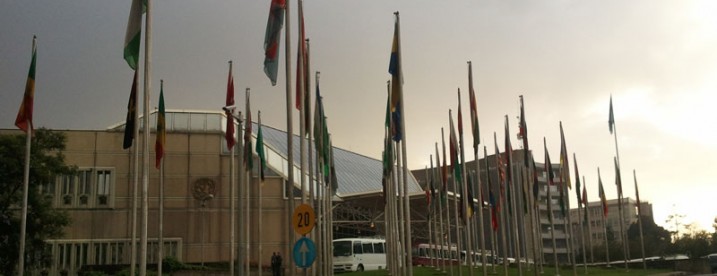
Game-Changing Recommendations Urge Institutionalization of Efforts to Combat Illicit Flows, Promote Financial Transparency
Mbeki-Led Group Also Calls for Public Registries of Beneficial Ownership, Public Country-by-Country Reporting for Multinationals
WASHINGTON, DC / ADDIS ABABA, Ethiopia – Global Financial Integrity (GFI) welcomed a new report from the African Union (AU) and United Nations Economic Commission for Africa’s (UNECA) High Level Panel (HLP) on Illicit Financial Flows from Africa as a game-changer in the movement to curtail illicit financial flows and promote financial transparency. Chaired by former South African President Thabo Mbeki, the HLP’s final report recommends putting efforts to curtail trade-related illicit flows—constituting the vast majority of measurable illicit financial flows (IFFs)—foremost in African and global efforts to curb the ongoing illegal outflow of African wealth.
By Joseph Spanjers, January 20, 2015
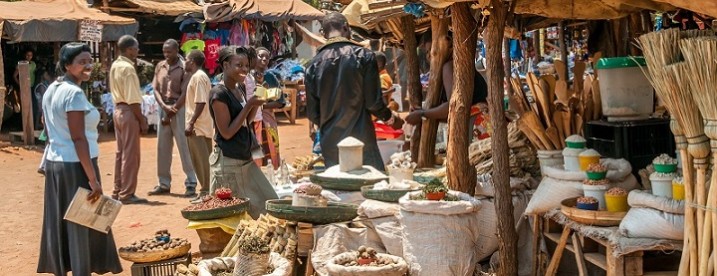
As a Percent of GDP, Sub-Saharan Africa Suffers the Largest Illicit Outflows of Any Region in the World
Global Financial Integrity’s (GFI) latest annual report on illicit financial flows–released just last month–estimates the volume of illicit financial outflows from the developing world from 2003 to 2012. It is the first report to estimate these flows for 2012, when they reached a record US$991.2 billion.
Already, this US$991.2 billion figure is being cited quite a bit; it is the main figure cited in many of the articles of we’ve seen on the report in the media. Take, for example, this story in The Guardian, this article from Reuters, or this piece in The Wall Street Journal. It’s the big, flashy, almost-trillion dollar number.
However, I’d like to draw your attention to a different figure, one that emphasizes even more clearly the implications of illicit financial flows on development: 5.5.
By Tom Cardamone, December 24, 2014
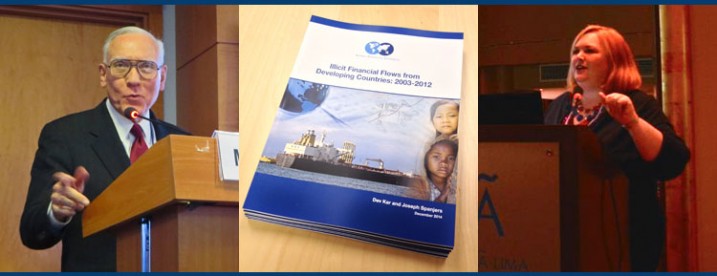
A Quarterly Newsletter on the Work of Global Financial Integrity from October through December 2014
Global Financial Integrity is pleased to present GFI Engages, a quarterly newsletter created to highlight events at GFI and in the world of illicit financial flows. We look forward to keeping you updated on our research, advocacy, high level engagement, and media presence. The following items represent just a fraction of what GFI has been up to since September, so make sure to check our new website for frequent updates.
World Bank Forum on Illicit Financial Flows
On October 11, GFI President Raymond Baker was a featured member of a World Bank panel, titled “Illicit Financial Flows and the Post-2015 Development Agenda,” which focused on the need to curtail the negative effects of illicit financial flows on sustainable development.
Held during the IMF/World Bank Annual Meetings, the public forum was hosted by the World Bank Group’s Integrity Vice Presidency and included high-profile speakers from Bangladesh, Denmark, Norway, and the Untied States.
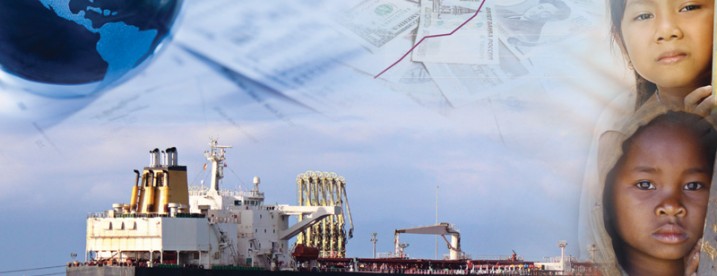
Illicit Flows from Developing & Emerging Countries Growing at 9.4% per Year
US$6.6 Trillion Stolen from Developing World from 2003-2012; Trade Misinvoicing Responsible for 77.8% of Illicit Outflows
China, Russia, Mexico, India, Malaysia—in Declining Order—Are Biggest Exporters of Illicit Capital over Decade; Sub-Saharan Africa Still Suffers Biggest Illicit Outflows as % of GDP
Study Calls for UN Sustainable Development Goals to Halve Annual Trade-Related Illicit Flows by 2030; Recommends Public Registries of Beneficial Ownership; Urges Public Country-by-Country Reporting for Multinationals
WASHINGTON, DC – A record US$991.2 billion in illicit capital flowed out of developing and emerging economies in 2012—facilitating crime, corruption, and tax evasion—according to the latest study released Tuesday by Global Financial Integrity (GFI), a Washington, DC-based research and advisory organization. The study is the first GFI analysis to include estimates of illicit financial flows for 2012.
By Joseph Spanjers, November 21, 2014
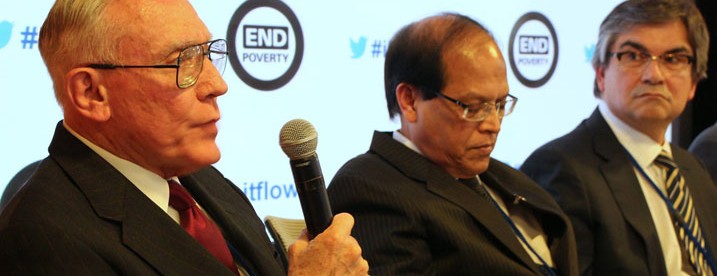
Mexico and Bangladesh Voice Support for a Clear Target on Curbing Illicit Financial Flows on the Sustainable Development Agenda
The United Nations is in the process of forming the post-2015 development agenda. These proposed Sustainable Development Goals (SDGs) will eventually replace the Millennium Development Goals (MDGs) that were agreed upon for 2000-2015. As with the MDGs, the SDGs will inform which development issues take priority in the coming years.
Sustainable Development Goal 16.4, as is currently proposed by the UN’s Open Working Group, calls on the international community to:
“by 2030 reduce illicit financial and arms flows, strengthen recovery and return of stolen assets, and combat all forms of organized crime.”
Global Financial Integrity (GFI) applauds the Open Working Group for considering illicit financial flows in its proposal. Though Goal 16.4 is definitely a start in the right direction, it is not exclusively focused on illicit financial flows, nor is it measurable in the least. GFI proposes the following as an alternative:
“by 2030, reduce illicit financial flows related to trade misinvoicing by 50%.”
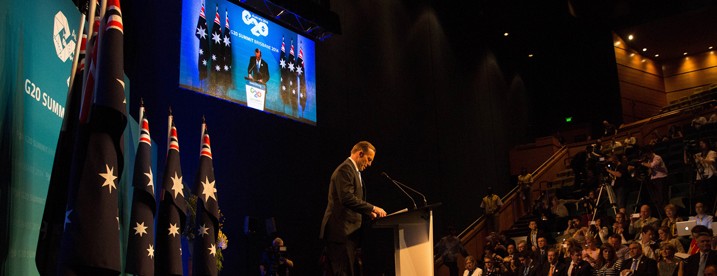
World Leaders’ Weekend Summit Misses Opportunity to Act on Beneficial Ownership or Country-by-Country Reporting
Work Remains to Ensure Developing Countries Benefit Fully From Global Automatic Exchange of Financial Information, but Agreement to Include Developing Countries in OECD BEPS Project an Encouraging Move
WASHINGTON, DC – G20 leaders met this past weekend in Brisbane, Australia for their annual summit, issuing a communiqué full of ambitious proposals for growing the global economy, but noticeably lacking in responses to illicit financial flows, one of the largest drags on development worldwide. Global Financial Integrity (GFI), a Washington, DC-based research and advocacy organization, expressed its disappointment at the underwhelming result.
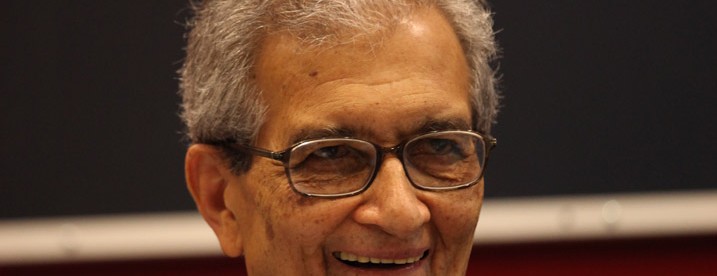
ASAP, GFI, and Yale Inaugurate Prize Honoring Nobel-Winning Economist Amartya Sen
2014 Contest Solicited Essays on Connection between Illicit Flows, Global Poverty, Inequality
WASHINGTON, DC / NEW HAVEN, CT – Academics Stand Against Poverty (ASAP), Global Financial Integrity (GFI), and the Yale Global Justice Program awarded the inaugural Amartya Sen Prize over the weekend to Max Everest-Phillips, Hamish Russell, and Gillian Brock for their essays on illicit financial flows, poverty, and inequality.
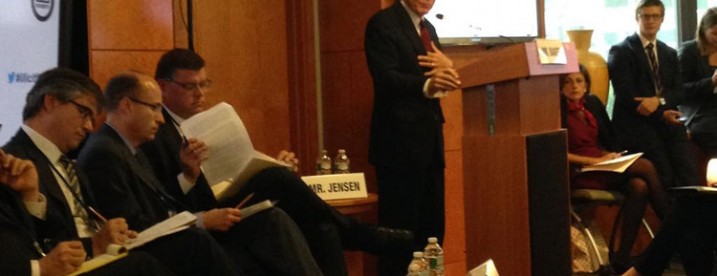
GFI President Raymond Baker participated in “Illicit Financial Flows on the Post-2015 Development Agenda,” a panel discussion organized by the World Bank ‘s Integrity Vice Presidency on October 11, 2014 during the 2014 IMF/World Bank Annual Meetings. The forum addressed the issue of illicit financial flows in the context of the Post-2015 Sustainable Development Agenda.
Joining Mr. Baker on the panel were (in alphabetical order) Hans Brattskar, State Secretary, Ministry of Foreign Affairs, Norway; Mogens Jensen, Minister for Trade and Development Cooperation, Denmark; Marcel, Senior Director, World Bank Group; Leonard Mccarthy, Integrity Vice President, World Bank Group; Dr. Atiur Rahman, Governor, Central Bank of Bangladesh; and Nena Stoiljkovic, Global Practices Vice President, World Bank Group.








